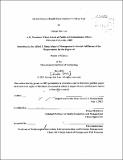Do job-seekers benefit from contacts? : a direct test
Author(s)
Lan, George
DownloadFull printable version (1.621Mb)
Other Contributors
Sloan School of Management.
Advisor
Elena Obukhova.
Terms of use
Metadata
Show full item recordAbstract
While it is intuitively plausible that using contacts in job search benefits a job-seeker, there is still both theoretical disagreement and inconclusive empirical evidence on why a job-seeker's social capital is associated with her labor-market outcomes (for reviews, see Mouw 2003, 2006). We take an important step toward identifying the source of this association by proposing a direct test for whether or not a job-seeker benefits from using her social networks. This direct test holds an important advantage over an indirect test proposed by Mouw (2003). By using a within-individual fixed-effects methodology, the direct test rules out most sources of between-individual heterogeneity (Yakubovich 2005). Therefore, its results are not influenced by the quality of the measures used to assess a job-seeker's social capital. Using unique data on university graduates' successful and unsuccessful job-searches, we show that, for job-seekers who use contacts to search for jobs, that method leads to better labor-market outcomes than formal methods do. We conclude by discussing the implications of our findings for the literature on job search and social networks.
Description
Thesis (S.M.)--Massachusetts Institute of Technology, Sloan School of Management, 2012. Cataloged from PDF version of thesis. Includes bibliographical references (p. 30-32).
Date issued
2012Department
Sloan School of ManagementPublisher
Massachusetts Institute of Technology
Keywords
Sloan School of Management.